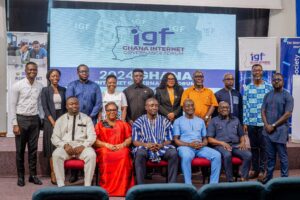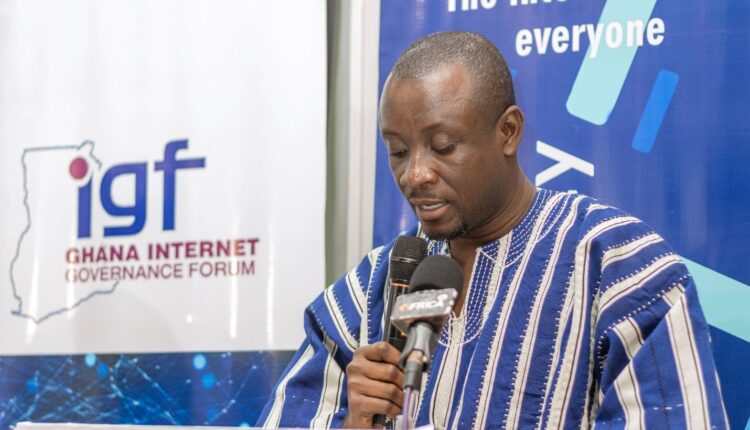The Ghana Domain Name Registry (GDNR), under the Ministry of Communications and Digitalisation in partnership with Ghana Internet Governance Forum (IGF) last week opened the 2024 Ghana IGF Forum, gathering key stakeholders from government, private sector, civil society, and academia to discuss the future of Ghana’s digital landscape.
The event was held under the theme: “Empowering Sustainable Development of Our Digital Future,” this year’s forum focuses on Ghana’s ongoing digital transformation and collaborative efforts to ensure a secure, inclusive, and sustainable digital economy.
Opening the event at the Ghana- Indian Kofi Annan Centre of Excellence in ICT (GI-KACE) in Accra), the Deputy Minister for Communications and Digitalisation, Hon. Charles Acheampong (MP), speaking on behalf of the Sector Minister, Mrs. Ursula Owusu-Ekuful (MP), applauded the Ghana Domain Name Registry (GDNR) for organizing the forum.
He emphasized the critical role digital technologies play in bridging societal gaps and creating new opportunities for economic growth, while ensuring no community is left behind.
“There is no gainsaying that the GDNR has been instrumental in driving the Internet Governance Forum in Ghana over the years. The local domain name space is one of the backbones of our digital economy, and the Registry continues its efforts to make the .GH domain a flagship extension for all Ghanaians and Ghana-based companies. Their work in raising awareness, building capacity within the local Internet community, and hosting the DNS Forum in Ghana deserves our commendation”, Hon. Acheampong said.
He added, “The Ghana IGF has evolved into a pivotal platform for our digital transformation, providing a unique space for multistakeholder dialogue. It allows government, industry, and civil society to come together to shape policies and propose solutions to accelerate Ghana’s digital future”.
According to him, this year’s IGF, resonates deeply with our collective vision of leveraging digital technologies to foster sustainable development and inclusive growth in Ghana
“Central to our efforts not to leave anyone behind is the Ghana Rural Telephony and Digital inclusion Project which to date has constructed over 1,010 cell sites across the country, expanding mobile and broadband coverage to underserved and unserved communities. These initiatives have brought essential communication services to millions of Ghanaians who were previously excluded from the digital revolution. Additionally, the establishment of Community Information Centres and digital inclusion programs is equipping citizens with the skills necessary to thrive in the digital economy”, he noted.
Mr. Acheampong also highlighted the National Roaming Policy, which has enabled seamless connectivity across networks, particularly benefiting rural communities. This policy underscores the government’s commitment to bridging the digital divide.

Safeguard
“Trust is the foundation of a healthy digital ecosystem,” the Deputy Minister stressed, adding that safeguarding user privacy, combating misinformation, and fostering accountability remain top priorities as Ghana advances towards a more connected and digitized economy.
According to him, the Cyber Security Authority (CSA) continues to lead efforts to secure the nation from growing cyber threats through a comprehensive cybersecurity framework.
The CSA’s role, he noted, is critical not only in protecting citizens but also in positioning Ghana as a global digital hub. With the rising importance of cybersecurity, Ghana’s proactive measures serve as a benchmark for digital resilience on the continent.
The Path Forward
Mr. Acheampong highlighted the Ministry’s Digital Economy Policy, which is designed to foster economic growth, improve governance, and enhance citizens’ quality of life through ICT. The policy covers key areas such as digital infrastructure, digital literacy, cybersecurity, and innovation, with a focus on closing the gender digital divide.
Looking ahead to the Global IGF in Saudi Arabia later this year, the Deputy Minister expressed optimism that the insights from Ghana IGF 2024 would contribute to the global conversation on building a multi-stakeholder digital future.
The Deputy Director-General of Technical Operations at the National Communications Authority (NCA), Prof. Ezer Osei Yeboah-Boateng, who delivered brief remarks on behalf of the Director-General, Dr. Joe Anokye said the NCA is satisfied in being part of an event that plays a crucial role in shaping the future of the internet in Ghana and extended gratitude to GDNR and the Internet Society Ghana Chapter for their contributions to the forum.
Prof. Yeboah-Boateng, reflecting on the theme, stated that the strides Ghana has made stand as a testament to the country’s progress.
However, he noted that there is still more work ahead, underscoring the collective commitment to further shape Ghana’s digital landscape.
Professor Yeboah-Boating also emphasized the importance of integrating technology into education as a key strategy for promoting sustainable development. He pointed out that the NCA, under the Ministry’s directive, has taken significant steps to enhance Ghana’s digital infrastructure, including the deployment of the 5G network. This infrastructure is essential for providing affordable, high-speed data services and advancing Ghana’s digital transformation agenda.


Comments are closed.